Abstract
Preventive interventions may have few or unproven benefits, or they may even be harmful. Since three of the fundamental precepts of Western biomedical ethics are beneficence, non-maleficence and respect for individual autonomy, failure to obtain truly informed consent for many current preventive interventions may be unethical. However, there are many impediments to obtaining such consent. Physicians need to be aware of an immense amount of up-to-date, complex information. It may be difficult for patients to assimilate this information, and there is rarely time for physicians to become informed and to inform their patients. Clinical practice guidelines may be helpful, but not all are based on evidence, and recommendations are often conflicting. Medical institutions, as well as individual clinicians, can help solve these dilemmas. Authors and journal editors can make a commitment to report and publish well-referenced evidence-based guidelines. Organizations such as the Canadian Task Force on the Periodic Health Examination and the US Preventive Services Task Force can develop balanced, evidence-based patient-information material. Faculty at all levels of medical education can increase their emphasis on the ethics of prevention. Individual clinicians should avoid making clinical decisions on the basis of relative reductions of morbidity or mortality, should use evidence-based clinical practice guidelines rather than those based on authority whenever possible, should make use of patient-information material and, most important, should have a consistent policy of obtaining informed consent from patients before they participate in potentially harmful preventive programs.
Full text
PDF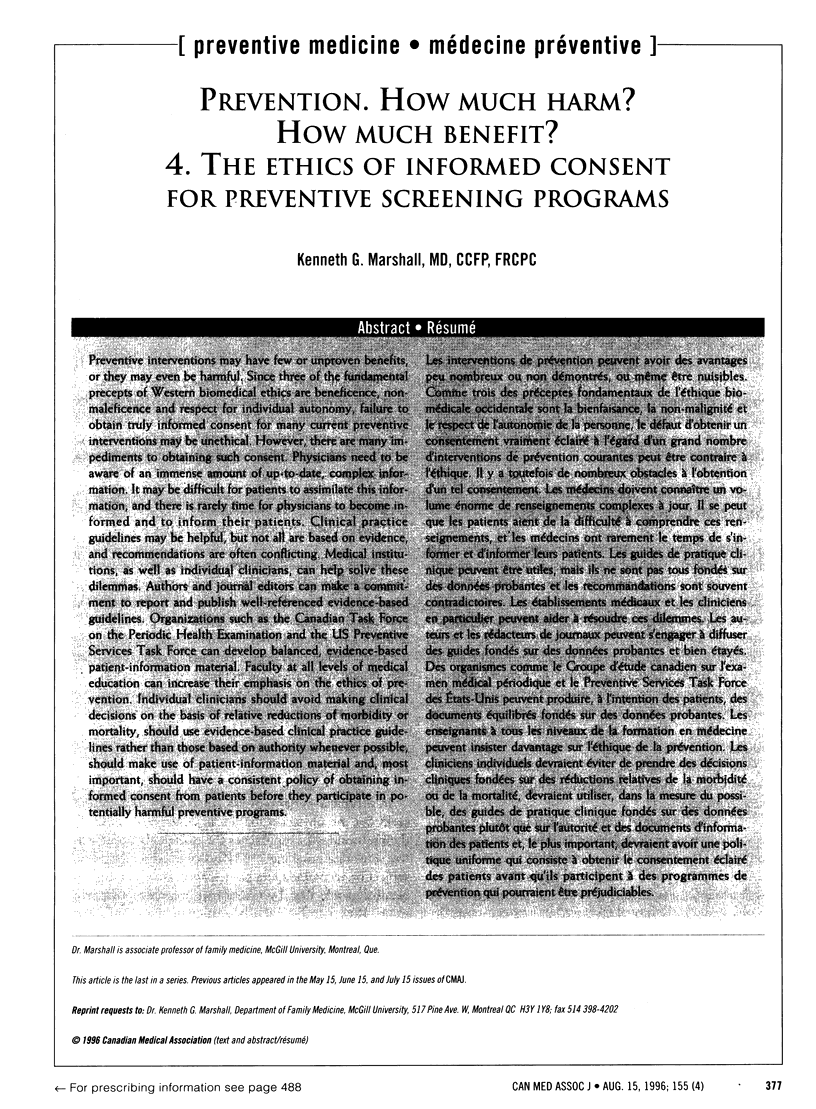
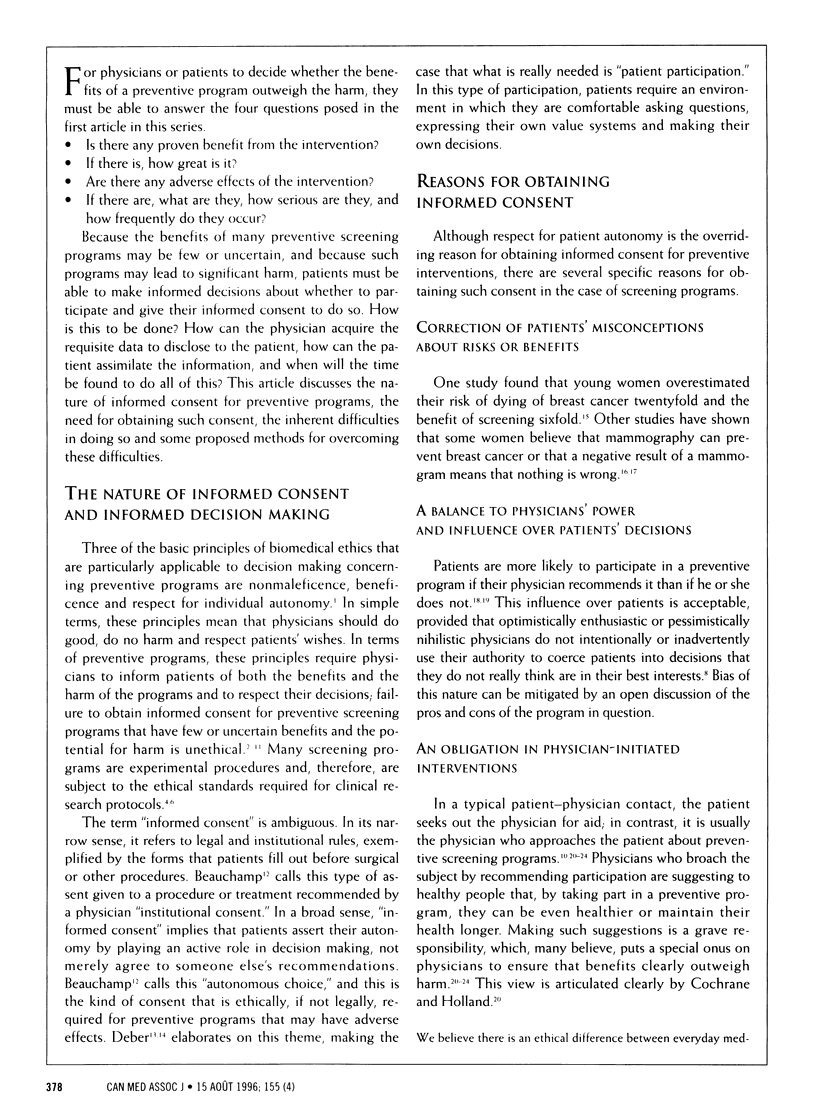
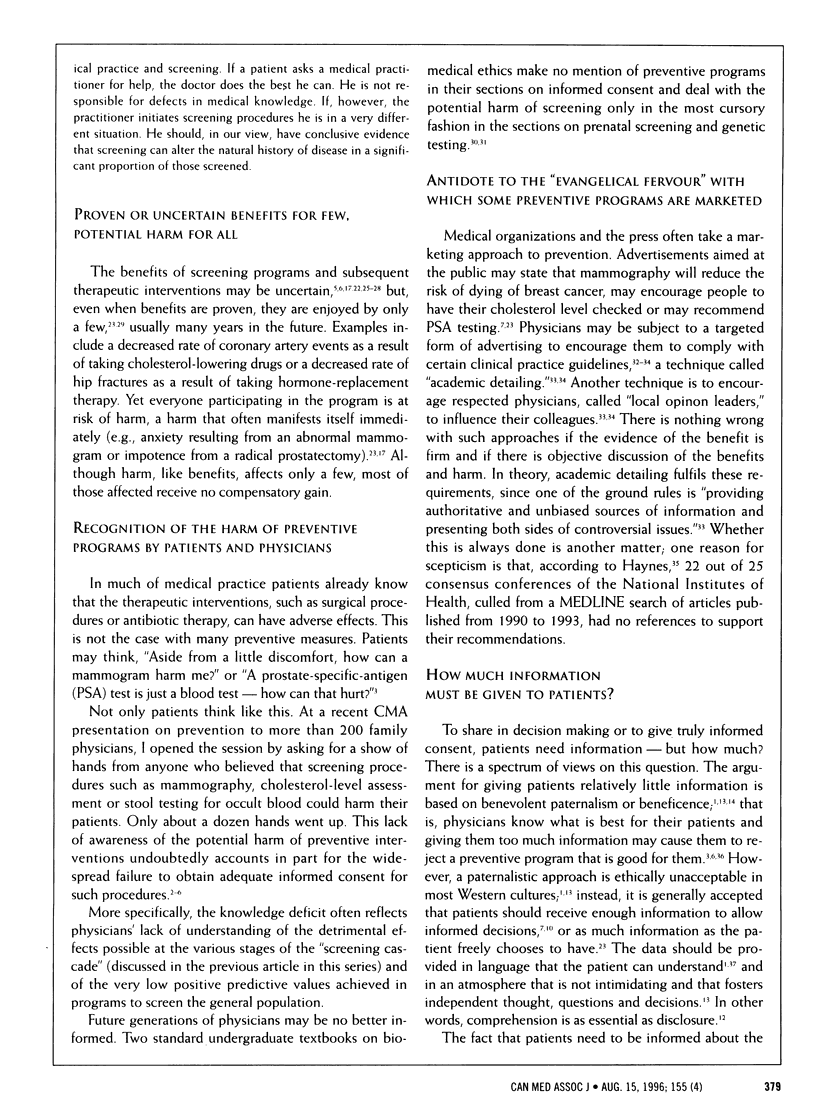
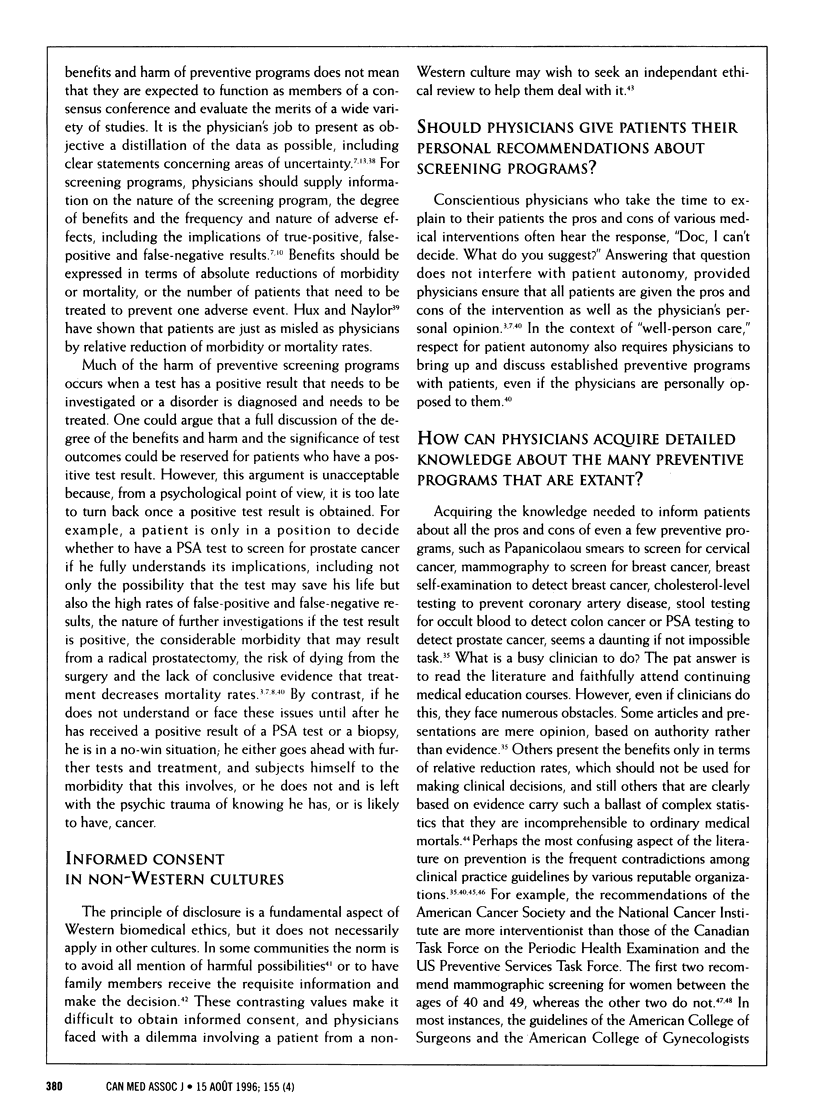
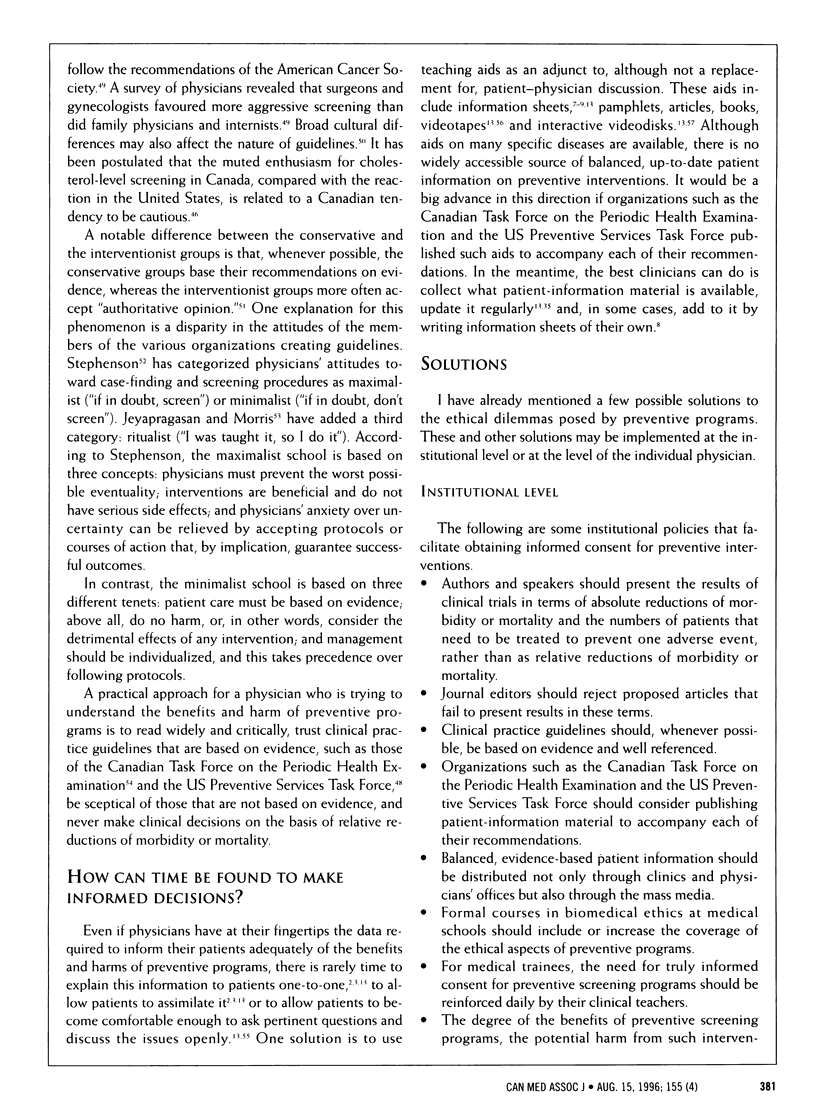
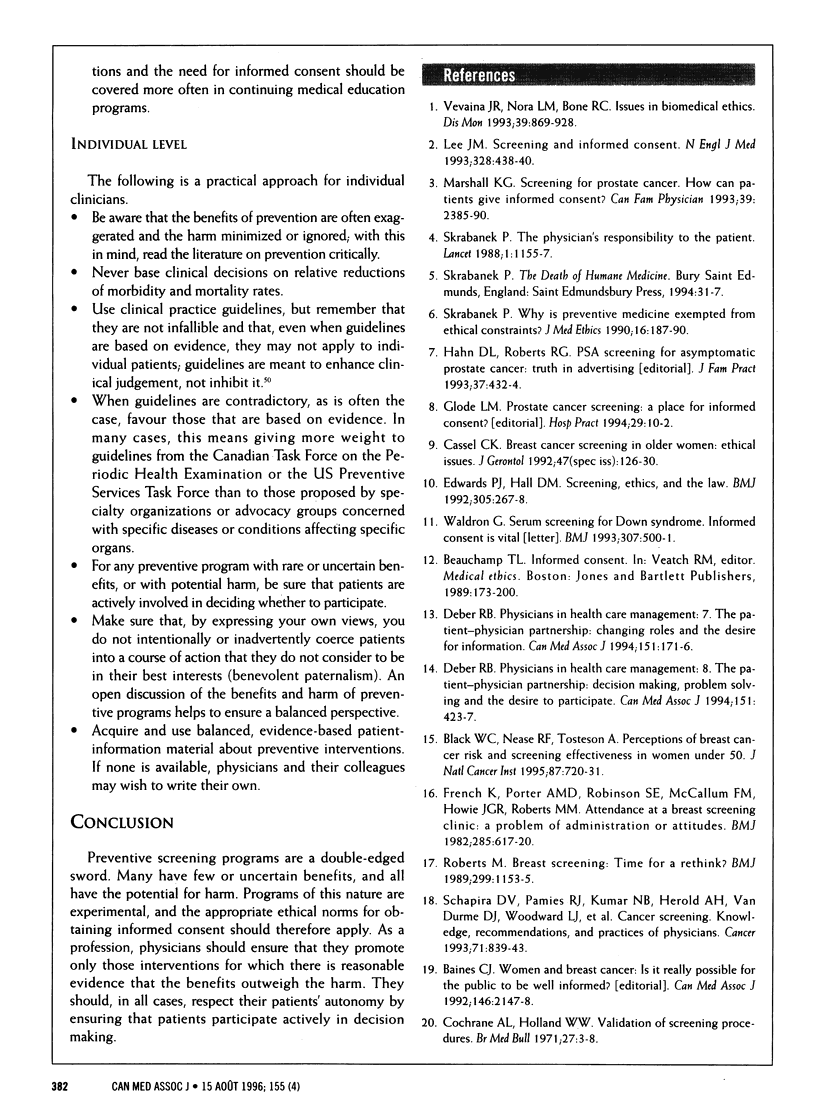
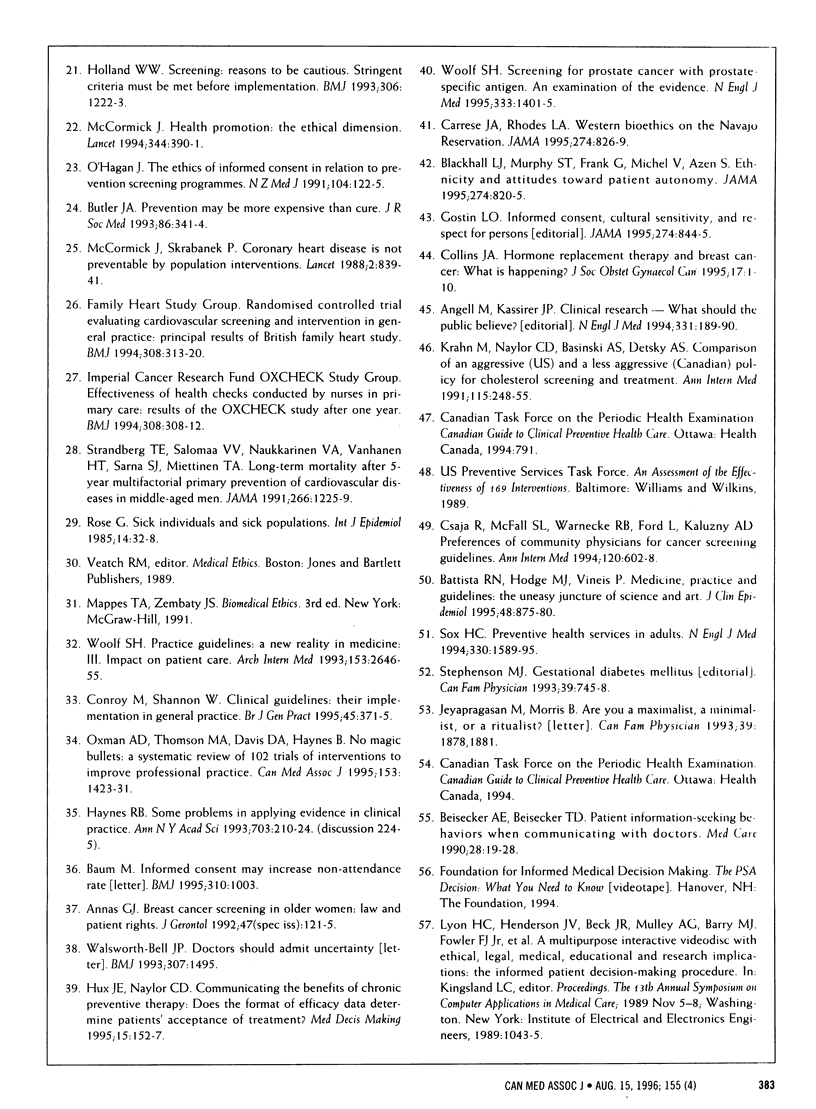
Selected References
These references are in PubMed. This may not be the complete list of references from this article.
- Annas G. J. Breast cancer screening in older women: law and patient rights. J Gerontol. 1992 Nov;47(Spec No):121–125. [PubMed] [Google Scholar]
- Baines C. J. Women and breast cancer: is it really possible for the public to be well informed? CMAJ. 1992 Jun 15;146(12):2147–2148. [PMC free article] [PubMed] [Google Scholar]
- Battista R. N., Hodge M. J., Vineis P. Medicine, practice and guidelines: the uneasy juncture of science and art. J Clin Epidemiol. 1995 Jul;48(7):875–880. doi: 10.1016/0895-4356(94)00199-z. [DOI] [PubMed] [Google Scholar]
- Baum M. Screening for breast cancer. Informed consent may increase non-attendance rate. BMJ. 1995 Apr 15;310(6985):1003–1003. doi: 10.1136/bmj.310.6985.1003. [DOI] [PMC free article] [PubMed] [Google Scholar]
- Black W. C., Nease R. F., Jr, Tosteson A. N. Perceptions of breast cancer risk and screening effectiveness in women younger than 50 years of age. J Natl Cancer Inst. 1995 May 17;87(10):720–731. doi: 10.1093/jnci/87.10.720. [DOI] [PubMed] [Google Scholar]
- Blackhall L. J., Murphy S. T., Frank G., Michel V., Azen S. Ethnicity and attitudes toward patient autonomy. JAMA. 1995 Sep 13;274(10):820–825. [PubMed] [Google Scholar]
- Butler J. A. Prevention may be more expensive than cure. J R Soc Med. 1993 Jun;86(6):341–344. doi: 10.1177/014107689308600611. [DOI] [PMC free article] [PubMed] [Google Scholar]
- Carrese J. A., Rhodes L. A. Western bioethics on the Navajo reservation. Benefit or harm? JAMA. 1995 Sep 13;274(10):826–829. [PubMed] [Google Scholar]
- Cassel C. K. Breast cancer screening in older women: ethical issues. J Gerontol. 1992 Nov;47(Spec No):126–130. [PubMed] [Google Scholar]
- Conroy M., Shannon W. Clinical guidelines: their implementation in general practice. Br J Gen Pract. 1995 Jul;45(396):371–375. [PMC free article] [PubMed] [Google Scholar]
- Czaja R., McFall S. L., Warnecke R. B., Ford L., Kaluzny A. D. Preferences of community physicians for cancer screening guidelines. Ann Intern Med. 1994 Apr 1;120(7):602–608. doi: 10.7326/0003-4819-120-7-199404010-00012. [DOI] [PubMed] [Google Scholar]
- Deber R. B. Physicians in health care management: 7. The patient-physician partnership: changing roles and the desire for information. CMAJ. 1994 Jul 15;151(2):171–176. [PMC free article] [PubMed] [Google Scholar]
- Deber R. B. Physicians in health care management: 8. The patient-physician partnership: decision making, problem solving and the desire to participate. CMAJ. 1994 Aug 15;151(4):423–427. [PMC free article] [PubMed] [Google Scholar]
- Edwards P. J., Hall D. M. Screening, ethics, and the law. BMJ. 1992 Aug 1;305(6848):267–268. doi: 10.1136/bmj.305.6848.267. [DOI] [PMC free article] [PubMed] [Google Scholar]
- French K., Porter A. M., Robinson S. E., McCallum F. M., Howie J. G., Roberts M. M. Attendance at a breast screening clinic: a problem of administration or attitudes. 1982 Aug 28-Sep 4Br Med J (Clin Res Ed) 285(6342):617–620. doi: 10.1136/bmj.285.6342.617. [DOI] [PMC free article] [PubMed] [Google Scholar]
- Glodé L. M. Prostate cancer screening: a place for informed consent? Hosp Pract (Off Ed) 1994 Sep 15;29(9):8, 11-2. [PubMed] [Google Scholar]
- Hahn D. L., Roberts R. G. PSA screening for asymptomatic prostate cancer: truth in advertising. J Fam Pract. 1993 Nov;37(5):432–436. [PubMed] [Google Scholar]
- Haynes R. B. Some problems in applying evidence in clinical practice. Ann N Y Acad Sci. 1993 Dec 31;703:210–225. doi: 10.1111/j.1749-6632.1993.tb26350.x. [DOI] [PubMed] [Google Scholar]
- Holland W. W. Screening: reasons to be cautious. BMJ. 1993 May 8;306(6887):1222–1223. doi: 10.1136/bmj.306.6887.1222. [DOI] [PMC free article] [PubMed] [Google Scholar]
- Hux J. E., Naylor C. D. Communicating the benefits of chronic preventive therapy: does the format of efficacy data determine patients' acceptance of treatment? Med Decis Making. 1995 Apr-Jun;15(2):152–157. doi: 10.1177/0272989X9501500208. [DOI] [PubMed] [Google Scholar]
- Krahn M., Naylor C. D., Basinski A. S., Detsky A. S. Comparison of an aggressive (U.S.) and a less aggressive (Canadian) policy for cholesterol screening and treatment. Ann Intern Med. 1991 Aug 15;115(4):248–255. doi: 10.7326/0003-4819-115-4-248. [DOI] [PubMed] [Google Scholar]
- Lee J. M. Screening and informed consent. N Engl J Med. 1993 Feb 11;328(6):438–440. doi: 10.1056/NEJM199302113280613. [DOI] [PubMed] [Google Scholar]
- Marshall K. G. Screening for prostate cancer. How can patients give informed consent? Can Fam Physician. 1993 Nov;39:2385–2390. [PMC free article] [PubMed] [Google Scholar]
- McCormick J. Health promotion: the ethical dimension. Lancet. 1994 Aug 6;344(8919):390–391. doi: 10.1016/s0140-6736(94)91407-9. [DOI] [PubMed] [Google Scholar]
- McCormick J., Skrabanek P. Coronary heart disease is not preventable by population interventions. Lancet. 1988 Oct 8;2(8615):839–841. doi: 10.1016/s0140-6736(88)92795-x. [DOI] [PubMed] [Google Scholar]
- Oxman A. D., Thomson M. A., Davis D. A., Haynes R. B. No magic bullets: a systematic review of 102 trials of interventions to improve professional practice. CMAJ. 1995 Nov 15;153(10):1423–1431. [PMC free article] [PubMed] [Google Scholar]
- Rose G. Sick individuals and sick populations. Int J Epidemiol. 1985 Mar;14(1):32–38. doi: 10.1093/ije/14.1.32. [DOI] [PubMed] [Google Scholar]
- Skrabanek P. Why is preventive medicine exempted from ethical constraints? J Med Ethics. 1990 Dec;16(4):187–190. doi: 10.1136/jme.16.4.187. [DOI] [PMC free article] [PubMed] [Google Scholar]
- Sox H. C., Jr Preventive health services in adults. N Engl J Med. 1994 Jun 2;330(22):1589–1595. doi: 10.1056/NEJM199406023302208. [DOI] [PubMed] [Google Scholar]
- Stephenson M. J. Gestational diabetes mellitus. Can Fam Physician. 1993 Apr;39:745–753. [PMC free article] [PubMed] [Google Scholar]
- Strandberg T. E., Salomaa V. V., Naukkarinen V. A., Vanhanen H. T., Sarna S. J., Miettinen T. A. Long-term mortality after 5-year multifactorial primary prevention of cardiovascular diseases in middle-aged men. JAMA. 1991 Sep 4;266(9):1225–1229. [PubMed] [Google Scholar]
- Vevaina J. R., Nora L. M., Bone R. C. Issues in biomedical ethics. Dis Mon. 1993 Dec;39(12):869–925. [PubMed] [Google Scholar]
- Waldron G., Williams E. S. Serum screening for Down's syndrome. Informed consent is vital... BMJ. 1993 Aug 21;307(6902):500–501. doi: 10.1136/bmj.307.6902.500-c. [DOI] [PMC free article] [PubMed] [Google Scholar]
- Walsworth-Bell J. P. Informed consent in clinical trials. Doctors should admit uncertainty. BMJ. 1993 Dec 4;307(6917):1495–1495. doi: 10.1136/bmj.307.6917.1495-a. [DOI] [PMC free article] [PubMed] [Google Scholar]
- Woolf S. H. Practice guidelines: a new reality in medicine. III. Impact on patient care. Arch Intern Med. 1993 Dec 13;153(23):2646–2655. [PubMed] [Google Scholar]
- Woolf S. H. Screening for prostate cancer with prostate-specific antigen. An examination of the evidence. N Engl J Med. 1995 Nov 23;333(21):1401–1405. doi: 10.1056/NEJM199511233332107. [DOI] [PubMed] [Google Scholar]



